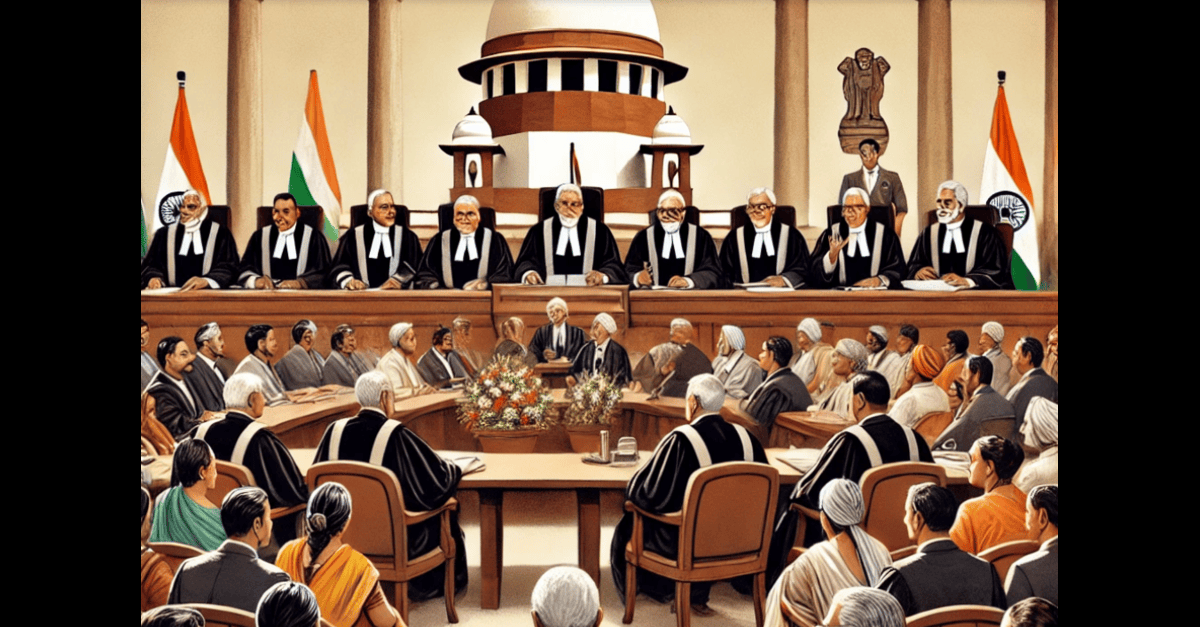INTRODUCTION:
This judgment is pronounced by the supreme court of India in the case of Vimal babu Dhumadiya v state of Maharashtra, it held that the judgment of the divisional bench of the high court Bombay is illegal under article 32 of constitution of India. The bench comprising of justices Vikram Nath, Sanjay Karol and Sandeep Mehta pointed out that if the petitioners are aggrieved by the judgment of high court, then they have to opt for the alternative remedies such as seeking its recall or filing a special leave petition under article 136 of the constitution. Through these decisions the supreme court of India highlighted and addressed the procedural frameworks and the jurisdictional limitation under article 32 of the constitution.
BACKGROUND
This dispute resulted from the judgment of the Bombay high court which ordered the demolition of five apartment complexes for not following the legal procedures or direction issued by the Mumbai metropolitan region development authority and it was being constructed on government land. The affected landowners and developers are directed to deposit 8 crore for rehabilitation purposes of the said land. The present petitioner claimed that they were not included as parties in the proceedings and were not given an opportunity to be heard. The petitioners were given multiple legal remedies. A special leave petition was filed
KEY POINTS
Jurisdiction under Article 32: Through this judgment the supreme court emphasized the importance of article 32 of the constitution remedy is meant to enforce the fundamental rights under the constitution Of India. This remedy cannot be used as the medium for declaring the judgments of high court as illegal. The bench of justice clearly expressed that the procedural grievances should be addressed through an already established legal mechanism, such as recall applications or special leave petition under article 136 of constitution of India.
Alternative Remedies: the supreme court highlighted the two specific remedies that are available to the petitioners in the present case:
Filing the recall application before the high court of Bombay, establishing the prime facie case that there exists the exclusion of petitioners from the proceedings.
The petitioner can challenge the order of the impugned judgment of the high court under article 136 of the constitution by filing a special leave petition before the supreme court.
Rejection of the writ petition: the supreme court rejected the writ petition filed under article 32 of the constitution leaving the room for other remedies which are permissible under the law. The judges further reiterated that the procedural irregularities will not amount to illegality of the judgment under article 32 of the constitution of India.
Rehabilitation: The high court ordered to pay 8 crores for rehabilitation to the affected parties and reiterated the order of demolishing the five apartments as it was constructed in the government area and did not follow the procedures laid down in the government notification.
RECENT DEVELOPMENT
The petitioners in the present have exhausted all the legal remedies such filing a special leave petition which was further dismissed by the supreme court. This supreme court decision clearly established the path under which the petitioner can seek remedy. Through this judgment the government differentiated the difference between the procedural aspects of the judgment and the legality of the judgment of the high court. The court further stated that challenging the legality of the high court judgment should be approached in the appropriate legal forum such as recall applications or special leave petitions rather than just invoking under article 32 of the constitution of India.
CONCLUSIONS
The decisions were held in Vimal babu Dhumadiya v state of Maharashtra which reiterated the procedural framework in challenging the order of the high court. It emphasizes that writ petition under article 32 is not the medium to challenge the judgment of high court and gives light on other two alternative remedies available such as filing a recall petition and approaching supreme court under article 136 as a special leave petition.
“PRIME LEGAL is a full-service law firm that has won a National Award and has more than 20 years of experience in an array of sectors and practice areas. Prime legal falls into the category of best law firm, best lawyer, best family lawyer, best divorce lawyer, best divorce law firm, best criminal lawyer, best criminal law firm, best consumer lawyer, best civil lawyer.”
WRITTEN BY: MUTHULAKSHMI B


